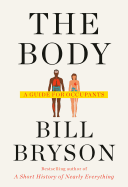
For 30 years, Bill Bryson (One Summer; A Walk in the Woods) has delighted readers with witty travelogues, explorations of English on both sides of the Atlantic and in-depth surveys ranging from the history of the home to the history of nearly, well, everything. In The Body, Bryson now turns inward to examine what makes us tick.
With comprehensive research and a sense of wonder, Bryson relays anatomic trivia both familiar and surprising. The sparks you see after looking at bright light are white blood cells passing before your retina. The heart pumps more gallons of blood each day than gallons of gas you put in your car in a year. We likely breathe oxygen molecules from everyone who has ever lived ("at the atomic level, we are in a sense eternal"). Bryson considers the unintended consequences of evolution: the skeletal adjustments made in order to walk upright have made human childbirth longer and more painful than it is for our fellow mammals; bipedalism also lengthened and repositioned our throats, which gave us the capacity for speech but also made humans susceptible to choking. Remarkably, despite tremendous advances in medicine, there is much we still don't know: What really causes asthma? Why do women digest foods more slowly than men? Why do our eyes move during REM sleep? Why do women retain only a fraction of the six million eggs they produce.
Sobering and contradictory facts about our lifestyles abound. Medicine has extended the length of our lives, but to a point of diminishing returns, and children today may reverse the trend and live shorter lives than their parents. But Bryson's journey nevertheless illustrates the expanding and astounding universe that exists within us all. --Frank Brasile, selection librarian, writer, editor

